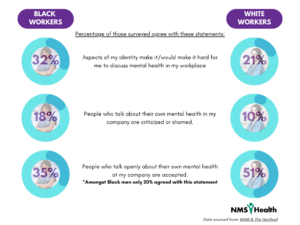Amidst the continued focus on workplace well-being, a recent report by The Hartford and the National Alliance on Mental Illness (NAMI) illuminated a crucial aspect that demands immediate consideration. This important report delves into the challenges faced by Black workers in the United States when it comes to accessing adequate mental health support in their work environments. Released on July 20, this comprehensive study sheds light on a disheartening reality: Black workers experience heightened barriers to mental health support compared to their peers from different racial and ethnic backgrounds. This revelation underscores the pressing need for holistic companywide education and keeping equity in mind when planning benefits.
The Hartford and NAMI survey builds upon their previously released 2022 Future of Benefits Study. The overarching aim of this survey was to delve into the intricate interplay between race, ethnicity, and cultural backgrounds, and their impact on individual perceptions and experiences of mental health. The survey was fielded by NORC in the Amerispeak Omnibus in two waves, May 27–30, 2022, and June 8–11, 2022. The survey design included a deliberate oversampling of diverse ethnicities, leading to an expansive and diverse sample of 2,320 participants. The dataset was refined to encompass only those currently employed, culminating in a sample size of 1,494 working adults.
Unveiling Disparities and Challenges
In a society that values diversity, it’s crucial to recognize and address disparities in mental health support. This study zeroed in on the experiences of Black workers in the U.S. It revealed that these individuals often encounter greater barriers to accessing the necessary mental health assistance compared to their White, Hispanic/Latino, and Asian American/Pacific Islander counterparts. The findings speak volumes – Black workers tend to rate their mental health lower and are less likely to believe that their workplace fosters open conversations about mental well-being. Additionally, they are more likely to face difficulties in discussing mental health due to factors like race, ethnicity, culture, and gender identity.

Perhaps more concerning, Black workers were more likely to report exclusion, hostility, and discrimination in the workplace which obviously disproportionately affects their mental health. These insights underscore the urgent need for change and a renewed commitment to cultivating an inclusive and supportive work environment for everyone.
Proposing Tangible Solutions
In response to the challenges presented, The Hartford and NAMI offer actionable steps to create transformative change. The first step is having senior leaders keep equity in mind and champion initiatives that normalize conversations about mental health. In addition, employers who are working to grow their efforts must be genuine in their initiatives.
Education also emerges as a potent tool, such as companywide mental health education programs which would allow employees to provide peer support and access the necessary resources. Employee Resource Groups (ERGs) also emerge as a vital asset, providing safe spaces that foster understanding and shared experiences.
DEI initiatives and employee resources should harmonize seamlessly with your company’s core values, aspirations, and principles. It’s essential that these initiatives translate into tangible and consistent actions, transcending verbal platitudes. A failure to communicate the existence and scope of these resources can lead to inadequate support for employees. The report underscores this, revealing that a significant 30% of Black respondents were unaware of the availability of mental health resources within their company. This statistic starkly contrasts with a lower percentage of 18% among White respondents who lacked awareness about these benefits.
A Call for Transformation and Empathy
The voices behind this research are unanimous in their call for action. The Hartford’s Chairman and CEO, Christopher Swift, expressed a powerful sentiment: “All Americans deserve safe, supportive, and mentally healthy work environments.” This aspiration underlines the importance of dismantling stigma, prioritizing diversity, equity, and inclusion, and fostering a sense of belonging for every member of the workforce.
A Collaborative Path Forward
Susan Johnson, head of diversity, equity and inclusion at The Hartford, writes in a separate article, “Regardless of where businesses are on their [Diversity, Equity, & Inclusion] journeys, they can take steps to build inclusive workplaces that consider the unique mental health needs of all employee groups. Companies that have established initiatives in place can be more intentional about progressing around mental health. And for employers who are just starting their DEI work, now is an ideal time to embed inclusive mental health initiatives into their strategies.”
Studies such as this shine a light on the evolving landscape of occupational health. The research not only identifies disparities but also paves the way for change, urging us all to play an active role in creating mentally supportive workplaces while keeping equity in mind. Together, we can dispel stigma, promote diversity and inclusion, and ensure that everyone has the resources needed to thrive.


